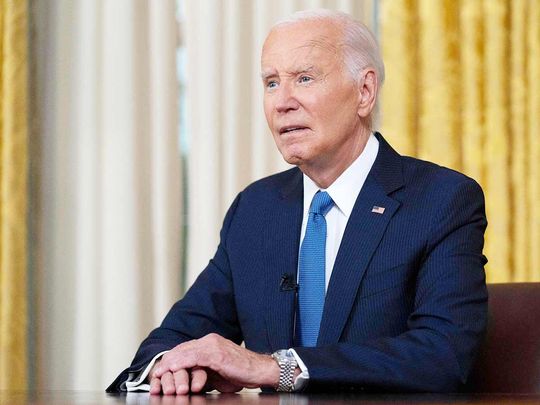
If it was a history-making moment it was so because only once before in modern American history had a sitting president declared to the nation, as President Biden did this past Sunday afternoon, that he would not run for a second term in office.
And that was well over half a century ago when President Lyndon Johnson, saddled with an unwinnable war in Vietnam that was highly unpopular at home, told “my fellow Americans” in a televised speech he delivered in March 1968, “I shall not seek, and I will not accept the nomination of my party for another term as your president”.
And just as at that time Johnson passed the torch on to his vice president, Herbert Humphry, so did Biden in our time pass it on to his own, Kamala Harris.
So who was (yes, we might as well get used to the past tense here) Joseph Robinette Biden, who became a one-term president by his volition, or at least seemingly so? And if we can’t get a fix on his place in history because we are still too close to the fact to know that, we can still ask what kind of man he was.
Only in America!
“He probably was mediocre after all, though in a very honourable sense of the word”, Nobel Prize winner (1929) Thomas Mann wrote about the protagonist Hans Castorp in his iconic novel, The Magic Mountain (1924).
Mann may as well have had Young Joe Biden in mind, a boy with a stutter who grew up in a working class neighbourhood in the hardscrabble town of Scranton, Pennsylvania, getting lacklustre grades in high school there and later equally lacklustre ones at college and law school.
Still, this young man shocked the nation when in 1972, at age 30, he became one of the youngest politicians in American history to be elected to the Senate and then, decades later, go on to find his way to the White House.
Only in America! Or, as the late social critic, author and dean of counterculture stand-up comedy, George Carlin, put it: “In America anyone can become president. That’s the problem”.
Still, Joe Biden, though undeniably mediocre, was “in a very honourable sense of the word” a decent man and a well-meaning politician who suffered grievously in life when, within two months of being elected to to the Senate in 1972, he lost his wife, Nadia, and young daughter in a tragic car crash, and in 2015 he lost his eldest son, Beau, to brain cancer.
Biden also suffered grievously on another level, when he chose to become a serial plagiarist — a reckless pursuit that over the years has destroyed many a career of many a prominent figure, most recently that of Claudine Gay, President of Harvard University, the Ivy League of Ivy Leagues in the US.
When he was in law school, Biden was caught lifting other writers’ work, and a faculty report dated December, 1965, attested to that when it concluded that “Mr. Biden had used five pages from a published law review without quotation or attribution”.
The plagiarism was easy to spot because it was both clumsy and transparent. But many years later his plagiarism from a speech by a British politician, equally clumsy and transparent, forced him to drop out of his 1988 presidential campaign — in disgrace.
Gaffe-prone President
Presidential aspirant Joe Biden, you see, had innocently assumed that no one would notice — and take him to task — when he lifted large chunks of a speech former Labor Party leader Neil Kinnock had delivered a year earlier in which the Welsh-born son of a coal miner complained about how in class-ridden Britain ordinary folks never get a chance to move up in life, and wondered why he was the first in his family, in a “thousand generations”, to go to college.
Biden, it appears, loved the rhetoric and he lifted, in its entirety, virtually word for word, that part of the British politician’s speech and incorporated it into one he delivered at a campaign rally in Iowa — forgetting that Kinnick’s thoughts did conform to the social and political realities in American society — surely not decades after the GI Bill.
The gaffe did Biden in. And he later dropped out of the race — though he went on, as if compulsively, to plagiarise, since evidence continued to surface of him lifting, almost verbatim, material from other politicians.
Then came the mental debilitation (benignly called “cognitive impairment” by clinical psychologists) which was difficult to ignore by the public and even more difficult to hide by presidential aides.
An example of that impairment was the time in September, 2022, a month after Republican Congresswoman Jackie Walorski had been killed (along with two of her staff members) in a car accident, and after the president had put out a statement saying he was “shocked and saddened at her death”, offering his deepest condolences, Biden looked around the room where he was holding a press conference, and asked, “Jackie, are you there? Where’s Jackie?”
Appearing confused at her absence, he then added, under his breath, seemingly to himself, “I thought she was going to be here today.” (Biden was 79 then.)
And the less said about the disaster that was the presidential debate the better. Better still is the less said about a president who over the last eight months, has become the bete noire of progressives anywhere you find them walking God’s green Earth, so for having enabled, directly or indirectly, the grisly death of 40,000 men, women and children in Gaza.
‘Bye, Joe. And thanks, no thanks for the memories.
— Fawaz Turki is a noted academic, journalist and author based in Washington DC. He is the author of The Disinherited: Journal of a Palestinian Exile








